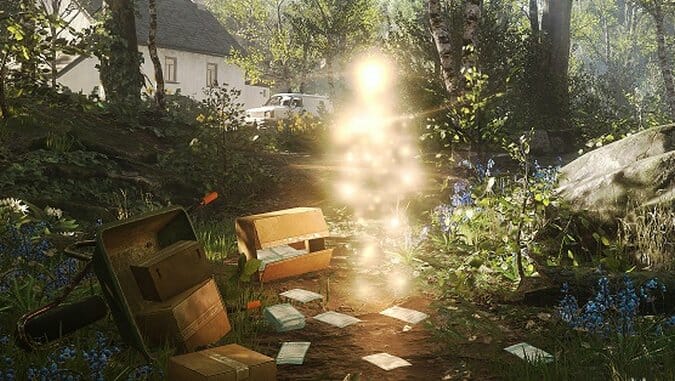Everybody’s Gone to the Rapture: Pieces of the People We Love

“The light we cast transcends our death.”—Everybody’s Gone to the Rapture
It’s possible that no game has ever summed itself up as succinctly as Everybody’s Gone to the Rapture does with that sentence. Beneath its apocalyptic sci-fi surface the Chinese Room’s newest game explores what it means to lose and to be lost. We never see any of its characters, but through their words and possessions we feel the impact they have on each other and their community, the connections that turn homes scattered around a farm into a village and not just a series of buildings.
That village, in a remote valley in Shropshire, is abandoned. Nobody’s in sight, cars sit derelict, unattended luggage litters every house and bus stop. It doesn’t look like anybody’s been here for days or weeks, but the cigarettes are still smoking in the ashtrays. Did they leave in a hurry just a few minutes ago? Something happened, something catastrophic, and Everybody’s Gone to the Rapture doesn’t want us to know when or why until it’s ready.
Investigating this mystery introduces us to a sprawling cast of friends and family, an elaborate web of personal relationships set in a rural, isolated village resembling a Thomas Hardy novel set in the 1980s. We don’t see the residents—again, they’ve all disappeared—but we hear snippets of their conversation when we pick up telephones or pass by certain clusters of light, golden silhouettes recreating their exchanges. We learn about Stephen Appleton, a native son and scientist who returns home with his American wife Kate Collins to work in a local observatory. We meet Stephen’s mother Wendy and uncle Frank, who no longer speak, and his former flame Lizzie Graves, who regrets never leaving. We hear children, teenagers, adults, the elderly, hinting about their lives and increasingly worried about an outbreak of something that doesn’t quite seem like influenza. We explore their modest homes, with their TV sets and small book collections and model train sets and abandoned luggage. We see the blood-stained handkerchiefs next to every couch and bed, growing more frequent the deeper we walk into the village.
The Chinese Room has created a world and a community that, in its depth and subtlety, feels real. It shares the verisimilitude of a Ken Loach film but without the politics, the characters sounding like real people having real conversations. Before the scope of the mysterious illness dawns on everybody and overtakes all conversations, we hear them talk about the sort of personal issues that videogames rarely discuss, like the slow pain of a disintegrating marriage, the anxiety of young parents, or the absence felt when a lifelong partner passes away. These moments of empathy and humanity are when Rapture excels, uncovering poignancy in areas this medium has generally considered too mundane to explore. (It should also be noted that the game’s use of sound is masterful, from the creepy emergency signals and radio static that suddenly puncture the unnatural silence, to the gorgeous score from Jessica Curry, heavy on choral pieces that underscore both the game’s examination of community and its religious themes.)
